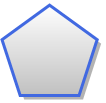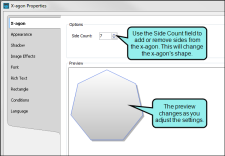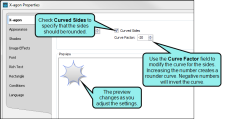An x-agon is a shape with multiple sides. You can change the number of sides to create new shapes. Additionally, you can set how much curve an x-agon's sides should have.
[Menu Proxy — Headings — Online — Depth3 ]
How to Modify the Sides
- Open an image that has an x-agon shape.
- Double-click the x-agon shape.
- In the properties dialog, select the X-agon tab.
-
To adjust the number of sides, change the number in the Side Count field. As you make changes, watch the Preview area at the bottom of the tab to see the results.
Note You can choose from 3 to 100 sides. The greater the number of sides, the more circular the shape becomes.
- Click OK.
- Click
 to save your work.
to save your work.
How to Change the Curvature
- Open an image that has an x-agon shape.
- Double-click the x-agon shape.
- In the properties dialog, select the X-agon tab.
- Click Curved Sides.
- To adjust the amount of curve, change the number in the Curve Factor field. The higher the number, the greater the curve. You can also enter negative numbers. As you make changes, watch the Preview area at the bottom of the tab to see the results.
- Click OK.
- Click
 to save your work.
to save your work.
Note A very useful tool when working with objects is a palette, which lets you store objects for future use. For example, if you are including callouts with some
What's Next?
If necessary, you can continue editing the image (e.g., adding objects, effects, a callout; cropping the image; resizing the image). Otherwise, you can finalize the image by saving it. See Editing Images.



